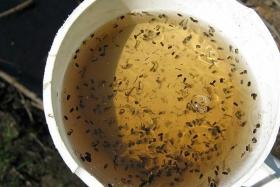Do citronella and ultrasonic repellents keep mosquitoes away?
With almost 10,000 cases of dengue recorded here in the first five months of the year, The Straits Times speaks to experts to find out whether measures such as citronella candles and ultrasonic repellents are effective at keeping mosquitoes away, and what sorts of things attract mosquitoes.
Q: Is there any scientific proof that ultrasonic repellents keep mosquitoes away?
A: There is currently no scientific evidence for the efficacy of such repellents, said Dr Milly Choy, a senior research fellow at Duke-NUS Medical School.
Dr Choy, an expert in mosquito-borne diseases, said: "The rationale of those products is that the ultrasound will influence the sensory systems of the mosquitoes, but studies in the lab have not shown that they work."
Similar sentiments have been shared in the past by experts interviewed by the BBC, as well as the American Mosquito Control Association, which states on its website that numerous studies in the past 15 years have shown that such devices have "no repellency value whatsoever".
Q: How about repellents that use plant-based extracts like citronella and eucalyptus?
A: Dr Choy said that in contrast to ultrasonic repellents, certain plant extracts have been shown to display repelling properties against mosquitoes. However, such repellents are not as effective as chemical repellents, she added.
According to the National Environment Agency, repellents containing DEET, picaridin or IR3535 are more effective and last longer than repellents using plant-based extracts.
Q: Are mosquitoes attracted to certain colours or smells?
A: Dr Choy said that female mosquitoes feed on human blood to lay eggs and are attracted to humans due to the following: Heat, carbon dioxide and body odour.
Noting that mosquitoes are attracted to the smell of sweat and its components such as lactic acid, she added that taking a shower after exercising may make a person less attractive to mosquito bites.
Citing a recent study published in scientific journal Nature Communications, Dr Choy added that mosquitoes may also be more attracted to certain colours than others.
In the presence of carbon dioxide, they tend to be attracted to the colours cyan, orange, and red. This sensitivity to orange and red is correlated with the mosquitoes' strong attraction to the colour spectrum of the human skin, she added.
Q: Will all bites from Aedes mosquitoes result in dengue fever?
A: Not all bites from Aedes mosquitoes will result in dengue fever, said Dr Ruklanthi de Alwis, senior research fellow with Duke-NUS Medical School's Emerging Infectious Diseases Programme.
"There are many steps before transmission can happen," said Dr de Alwis, who is also a senior research fellow at the SingHealth Duke-NUS Viral Research and Experimental Medicine Centre.
First, the mosquito must have been infected with the virus. The virus must then replicate sufficiently within the mosquito for it to become infectious. It must also reach the mosquito's salivary glands. The whole process takes about one week.
Even after this, about 75 per cent of people who are infected with dengue end up being asymptomatic, or with symptoms that are mild enough to not warrant a doctor's visit, she said.
Get The New Paper on your phone with the free TNP app. Download from the Apple App Store or Google Play Store now



